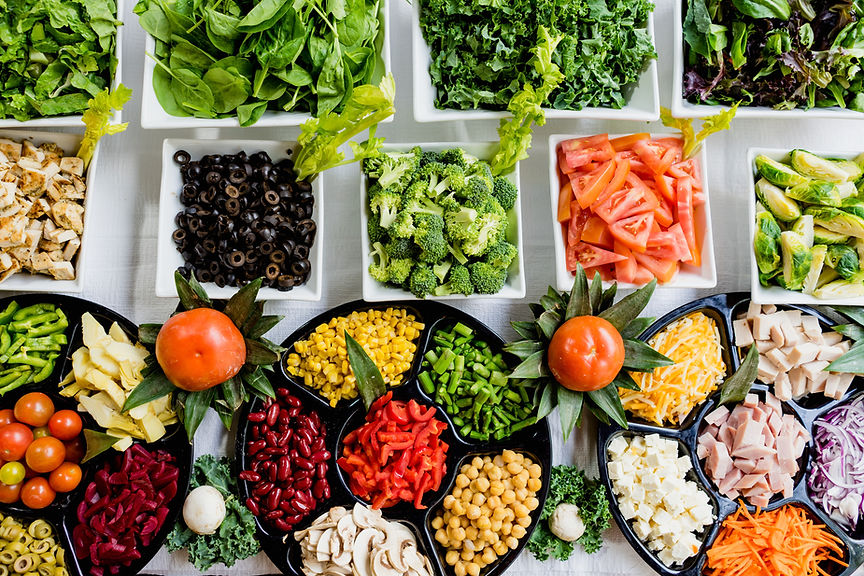

the path of
DIET
THE DIET PATH
The diet path is perhaps the most important element of your health. Your body is a consequence of the food you have consumed, hence the common phrase, "You are what you eat". Eating well has profound many benefits on body health including weight management, body composition, skin, organs functioning efficiently and much more.
Understanding health in nutrition will go a long way to how you feel, how you look and more importantly how your body functions. The importance of diet cannot be overstated in the context of self-development. It serves as the foundation upon which your physical and mental well-being is built, much like climbers meticulously choose their gear and supplies for a successful ascent.
Your diet provides the essential fuel for your body and mind, powering your daily activities, cognitive functions, and emotional stability. A balanced diet, rich in nutrients, vitamins, and minerals, not only supports physical health, helping to maintain a healthy weight and reduce the risk of chronic diseases but also profoundly influences your mental well-being.
It provides the raw materials for neurotransmitters that affect your mood and cognitive function, potentially reducing the risk of mental health conditions such as depression and anxiety. Moreover, a well-balanced diet ensures a steady supply of energy throughout the day, keeping you alert and productive. In the grand scheme, a healthy diet path can even contribute to a longer, more fulfilling life, ultimately helping you embark on a successful journey of self-development.

CALORIES
Understanding calories is essential for effortless weight management. Whether your goal is to lose or gain weight or simply maintain the weight you are at, you should spend some time understanding the nature of calories.
In simple terms, a calorie is a measurement of a unit of energy. Foods that you eat contain calories (energy) and the body requires a certain amount of calories each day to function optimally this is known as the BMR (basal metabolic rate). Your body will burn this many calories every day regardless of how active or inactive you are.
Calorie Deficit
If you are in a calorie deficit the body doesn't have enough calories (energy) to function. The body will go to your fat stores and burn fat for the remaining energy it requires. You could achieve a deficit by eating fewer calories than the body requires each day and forcing your body into a calorie deficit or your activity level is burning through more calories than you are eating, both create the same response. It's simply calories in vs. calories out.
Calorie Surplus
The opposite of a deficit. Consume more calories than the body needs and the excess energy (calories) will be stored as fat. The body is built to be efficient and survive and it prefers to do this where it can. Any surplus of calories each day will mostly be stored in fat. If you are training you may build muscle will a small percentage of the surplus but the rest will be stored as fat.
Maintenance
Eat around the calories the body needs and you will neither put on weight nor lose it. Learning how to stay in this range effortlessly will mean you are always in control of your weight.

There are 3500 calories in 1lb of fat. A calorie deficit of 500 calories every day will burn 1lb of fat in a week.
CALORIES AND MAINTENANCE
Maintenance calories represent the equilibrium point where the energy you consume through food matches the energy your body expends in daily activities and to maintain its current weight. It's akin to the baseline for your body's energy balance, much like climbers planning their supplies for a balanced and steady journey. Understanding your maintenance calorie level is pivotal for managing weight, as it serves as the reference point from which you can make adjustments for weight loss, gain, or maintenance. By calculating your maintenance calories and making informed dietary choices, you can embark on a balanced and sustainable path towards achieving and maintaining your desired weight and overall well-being.
Factors Influencing Maintenance Calories
Several factors influence your maintenance calorie level, including your basal metabolic rate (BMR) - the energy your body needs at rest - physical activity, age, gender, and muscle mass. Climbers consider the terrain, weather conditions, and their gear's weight for a successful journey; similarly, these factors affect your maintenance calories.
Finding your maintenance calories and subsequently adjusting your calorie intake to gain or lose weight involves a few steps:
1. Calculate Your Maintenance Calories:
-
Begin by calculating your Basal Metabolic Rate (BMR), which is the number of calories your body needs at rest. The Harris-Benedict equation, apps like MyFitnessPal or an online calculator can help with this.
-
Factor in your daily physical activity level using the Harris-Benedict equation or a multiplier (e.g., Sedentary, Lightly Active, Moderately Active, Very Active).
-
Add your BMR and activity calories to find your total daily energy expenditure (TDEE). This represents your maintenance calories - the amount you need to maintain your current weight.
2. Adjusting Caloric Intake for Weight Goals:
-
Weight Gain: To gain weight, you need to consume more calories than your TDEE. A safe rate is typically around 250-500 calories above maintenance per day. This surplus should come from nutritious foods rich in protein, healthy fats, and carbohydrates.
-
Weight Loss: To lose weight, you should create a caloric deficit by consuming fewer calories than your TDEE. A common guideline is aiming for a deficit of 500 calories per day, resulting in a gradual and sustainable weight loss of about 1-2 pounds per week. Focus on nutrient-dense foods to maintain health while losing weight.
3. Monitor and Adjust:
-
Regularly track your calorie intake and weight changes. Online apps and food journals can be helpful tools.
-
Be patient and realistic with your goals. Sustainable weight changes take time, just as climbers progress step by step towards their summit.
-
Periodically reassess your maintenance calories and adjust your intake based on your changing weight and activity levels.
Remember, it's crucial to prioritise the quality of the calories you consume. A balanced diet path that includes a variety of nutrients is essential for overall health and well-being, much like climbers needing various supplies for a successful ascent. Additionally, consulting with a healthcare provider or registered dietitian can provide personalised guidance to help you achieve your weight-related goals safely and effectively.

MACRONUTRIENTS
Carbohydrates
Carbohydrates are like the body's primary source of fuel, much like climbers rely on a steady supply of energy during their ascent. They are found in foods like grains, fruits, vegetables, and legumes. Carbs are converted into glucose, a form of sugar that the body uses for immediate energy. Simple carbohydrates, like those in candy and soda, provide quick but short-lived energy bursts. Complex carbohydrates, found in foods like whole grains and starchy vegetables, release energy gradually, promoting sustained endurance. Carbs also play a role in brain function and help spare protein for other vital functions.
Fats
Fats are akin to the body's long-lasting energy reserves, much like climbers carry extra supplies for extended journeys. They are found in foods like nuts, seeds, oils, and fatty fish. Fats are essential for several bodily functions, including the absorption of fat-soluble vitamins (A, D, E, and K) and the construction of cell membranes. They provide a concentrated source of energy and help maintain body temperature. While fats have more calories per gram than carbs and protein, they are a crucial part of a balanced diet. Healthy fats, such as monounsaturated and polyunsaturated fats, promote heart health, while saturated and trans fats should be limited.
Proteins
Proteins are the body's builders and repairers, much like climbers rely on tools to construct and maintain their gear. They are found in foods like meat, poultry, fish, dairy, beans, and tofu. Proteins are composed of amino acids, which are the building blocks of tissues, enzymes, and hormones. They play a vital role in muscle growth and repair, immune function, and the production of enzymes that facilitate various biochemical reactions.
Consuming a variety of protein sources ensures you get a wide range of amino acids, essential for overall health. Whether you're looking to build muscle, recover from exercise, or simply maintain your body's vital functions, protein is an indispensable part of your diet.
Balancing these macronutrients in your diet is crucial for optimal health and well-being. Just as climbers carefully prepare their gear for a successful ascent, it's essential to plan your diet to meet your body's specific needs and fuel your journey towards self-development.
Food is the fuel for the body, you wouldn't put the wrong fuel in your car and expect it to function properly, would you?
DIFFERENT DIETS
Various diet paths have gained popularity over the years, each with its own set of benefits and potential downsides. It's important to understand the nuances of different diets before choosing one to align with your goals and preferences, much like climbers carefully selecting their equipment for a specific expedition. Here are some examples:
-
Mediterranean Diet:
-
Benefits: Rich in fruits, vegetables, whole grains, and healthy fats (olive oil and nuts). It's associated with heart health, reduced risk of chronic diseases, and longevity.
-
Downfalls: Can be higher in calories due to the liberal use of olive oil and nuts, potentially leading to weight gain if not mindful of portion sizes.
-
-
Ketogenic Diet:
-
Benefits: Very low in carbs, which can lead to rapid weight loss and improved blood sugar control for some individuals.
-
Downfalls: Difficult to sustain long-term, can lead to nutrient deficiencies if not carefully planned, and may cause "keto flu" symptoms initially.
-
-
Vegan Diet:
-
Benefits: Plant-based, rich in fruits, vegetables, and fibre. Associated with lower risk of heart disease and certain cancers.
-
Downfalls: Requires careful planning to ensure adequate protein and nutrient intake, particularly vitamin B12 and iron.
-
-
Paleo Diet:
-
Benefits: Emphasises whole foods and eliminates processed items. May help with weight loss and digestive issues for some individuals.
-
Downfalls: Eliminates entire food groups, potentially leading to nutrient deficiencies. Can be expensive due to reliance on high-quality animal products.
-
-
Low-Carb Diet:
-
Benefits: Can lead to rapid weight loss and improved blood sugar control. Reduces cravings for sugary foods.
-
Downfalls: May lack dietary variety and fibre if not carefully planned. Can cause initial fatigue and irritability as the body adjusts to low-carb intake.
-
-
Intermittent Fasting:
-
Benefits: Can simplify meal planning, potentially aiding weight loss and improving insulin sensitivity.
-
Downfalls: May be challenging to maintain in social situations, and it's not suitable for everyone, particularly those with certain medical conditions.
-
-
DASH Diet:
-
Benefits: Focuses on whole foods, particularly fruits, vegetables, and lean proteins. Designed to lower blood pressure and promote heart health.
-
Downfalls: Requires attention to sodium intake, which can be challenging, especially when dining out.
-
Ultimately, the best diet for you depends on your individual goals, preferences, and health status. It's essential to choose a sustainable eating pattern that aligns with your lifestyle and provides the necessary nutrients. When it comes to diet the best is usually the one you can stick to. Different diets work for different people. Consulting with a registered dietitian or healthcare provider can offer personalised guidance to help you make informed dietary choices and embark on a balanced and healthy journey towards self-improvement, much like climbers who carefully select their gear for a successful ascent.

FUNDAMENTAL
Whilst there is not a one-size-fits-all approach to the diet path, there are fundamentals we can follow to maximise health return.
Wholefoods
The importance of whole foods in one's diet cannot be overstated, much like climbers rely on essential gear for a successful ascent. Whole foods are unprocessed or minimally processed, retaining their natural nutritional integrity. They are rich in essential nutrients, vitamins, minerals, fibre, and antioxidants, which collectively contribute to optimal health and well-being. Whole foods provide sustained energy, support weight management, and reduce the risk of chronic diseases such as heart disease, diabetes, and certain cancers. Moreover, they nourish the body at a cellular level, promoting vibrant skin, strong bones, and a well-functioning immune system. Incorporating whole foods into your diet is akin to selecting the best equipment for a challenging expedition; it's a foundational choice for a successful journey toward self-improvement and a healthier, more fulfilling life.
Organic foods
Organic foods are cultivated without the use of synthetic pesticides, herbicides, and genetically modified organisms (GMOs). They offer several crucial benefits. Firstly, they are free from potentially harmful chemical residues, reducing the risk of pesticide-related health issues. Organic farming practices prioritize soil health and biodiversity, which often results in more nutrient-dense produce. Additionally, organic livestock are raised without routine antibiotics or growth hormones, leading to potentially healthier meat and dairy products. By choosing organic, individuals not only support sustainable and environmentally friendly farming methods but also contribute to their own well-being, making it a valuable choice for those seeking a wholesome and health-conscious journey towards self-improvement.
BENEFITS

A balanced diet helps maintain a healthy weight, reducing the risk of obesity and associated health issues.

A diet rich in fibre from fruits, vegetables, and whole grains supports healthy digestion and prevents digestive disorders.

A proper diet provides essential nutrients, vitamins, and minerals necessary for overall health and well-being.

Proper nutrition can positively impact mood and cognitive function, reducing the risk of mental health conditions like depression and anxiety.

A nutritious diet can reduce the risk of chronic diseases such as heart disease, diabetes, and certain cancers.

A balanced diet provides sustained energy throughout the day, helping you stay active and productive.
Walks
"Foundations" lays the groundwork for holistic well-being by merging exercise and diet on Mount Evolve. It's the cornerstone of self-improvement, emphasising overall health. Refresh combines the diet and detox path to refresh and revitalise the body.
Hikes
"Strong Body, Strong Mind" is a dynamic path on Mount Evolve, harmonising meditation, exercise, routines and diet. It forms the cornerstone of holistic self-improvement. This transformative journey empowers individuals to cultivate physical strength and mental resilience, enhancing their overall well-being and supporting their ascent toward personal growth and self-mastery.
If diet is wrong,
medicine is of no use.
If diet is correct,
medicine is of no need.
Ayurvedic Proverb
The doctor of the future will no longer treat human with drugs but rather cure and prevent disease with nutrition.
Thomas Edison
Exercise is king. Nutrition is queen. Put them together and you've got a kingdom.
Jack Lalanne



